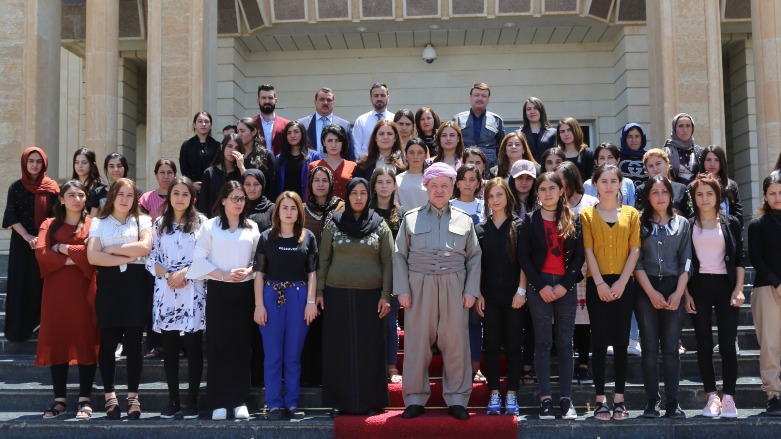Masoud Barzani meets dozens of Yezidi survivors, calls them ‘Symbol of Honor’

ERBIL (Kurdistan 24) – The President of the leading Kurdistan Democratic Party (KDP), Masoud Barzani, met on Monday with dozens of Yezidi (Ezidi) female survivors of the so-called Islamic State to discuss their situation and articulate his support.
In the meeting, the Secretary of Kurdistan Women Union and the Director-General of Ezidi Affairs in the Kurdistan Region’s Ministry of Endowment and Religious Affairs discussed how the Ezidi victims were rescued from the Islamic State and their ongoing rehabilitation.
Some of the survivors explained the tragedies they underwent at the hands of the terrorist group, with them being sold as slaves in a sex market and others physically and psychologically scarred by the Islamic State.
Barzani stated that what happened to Ezidis at the hands of the Islamic State is a continuation of heart-rending adversaries the people of the Kurdistan Region have suffered throughout history. He pointed to the Kurdish Anfal genocide that killed up to 182,000 people, the Halabja chemical attack, the disappearance of 12,000 Feyli Kurds, and the massacre of 8,000 Barzanis.
“The adversity which you experienced renewed all the pains our people had suffered in the past,” Barzani told the Ezidi survivors, according to a statement released by his press office.
The Islamic State’s emergence and its violent assault on Sinjar (Shingal) in 2014 led to the displacement of hundreds of thousands of Ezidis. Most of them fled to the Kurdistan Region, while others resettled in neighboring countries in the region or Western states.
Others were not as lucky and remained stranded in the war zone, where they experienced atrocities and mass executions at the hands of the terror group for years. Militants subjected women and girls to sexual slavery, kidnapped children, forced religious conversions, executed scores of men, and abused, sold, and trafficked females across areas they controlled in Iraq and Syria.
“I completely understand the pain and tragedy that you all suffered,” Barzani continued. “I re-emphasize that you are the symbol of honor of our people and are dear to us.”
“The terrorists, with their cruel behavior toward you, showed their barbarity and proved your oppression but, fortunately, with the sacrifices of Peshmerga heroes who avenged your losses, the terrorists were defeated and fell under your feet.”
Before the 2014 attack, there were roughly 550,000 Ezidis in the Kurdistan Region and Iraq. As the militants took over large swaths of territory in the Nineveh province, 360,000 Ezidis escaped and found refuge elsewhere, according to the Kurdistan Regional Government’s (KRG) Ezidi Rescue Office.
Barzani, who had served as president of the autonomous Kurdistan Region for 12 years starting from 2005, remains an influential figure in the political sphere in the region and Iraq. He stressed that he would do what is necessary for the rights of Ezidis through the Kurdistan Region Parliament and the KRG.
The Kurdish leader also discussed the current situation in the pre-dominant Ezidi town of Shingal in Nineveh, underlining that the administration of the area should be in the hands of its people, and displaced Ezidis should be able to return to their homes.
So far, over 69 mass graves which contain the remains of Ezidis have been found along with an untold number of individual graves.
Following the fall of Shingal, the Islamic State kidnapped 6,417 Ezidis. Since then, 4,476 of them had been rescued in Iraq and Syria, while the whereabouts of 2,941 Ezidis remains unknown, according to the Ezidi Rescue Office.
Out of 3,548 kidnapped female Ezidis, 1,184 of them have been rescued so far, data from the Rescue Office shows.
Editing by Karzan Sulaivany
